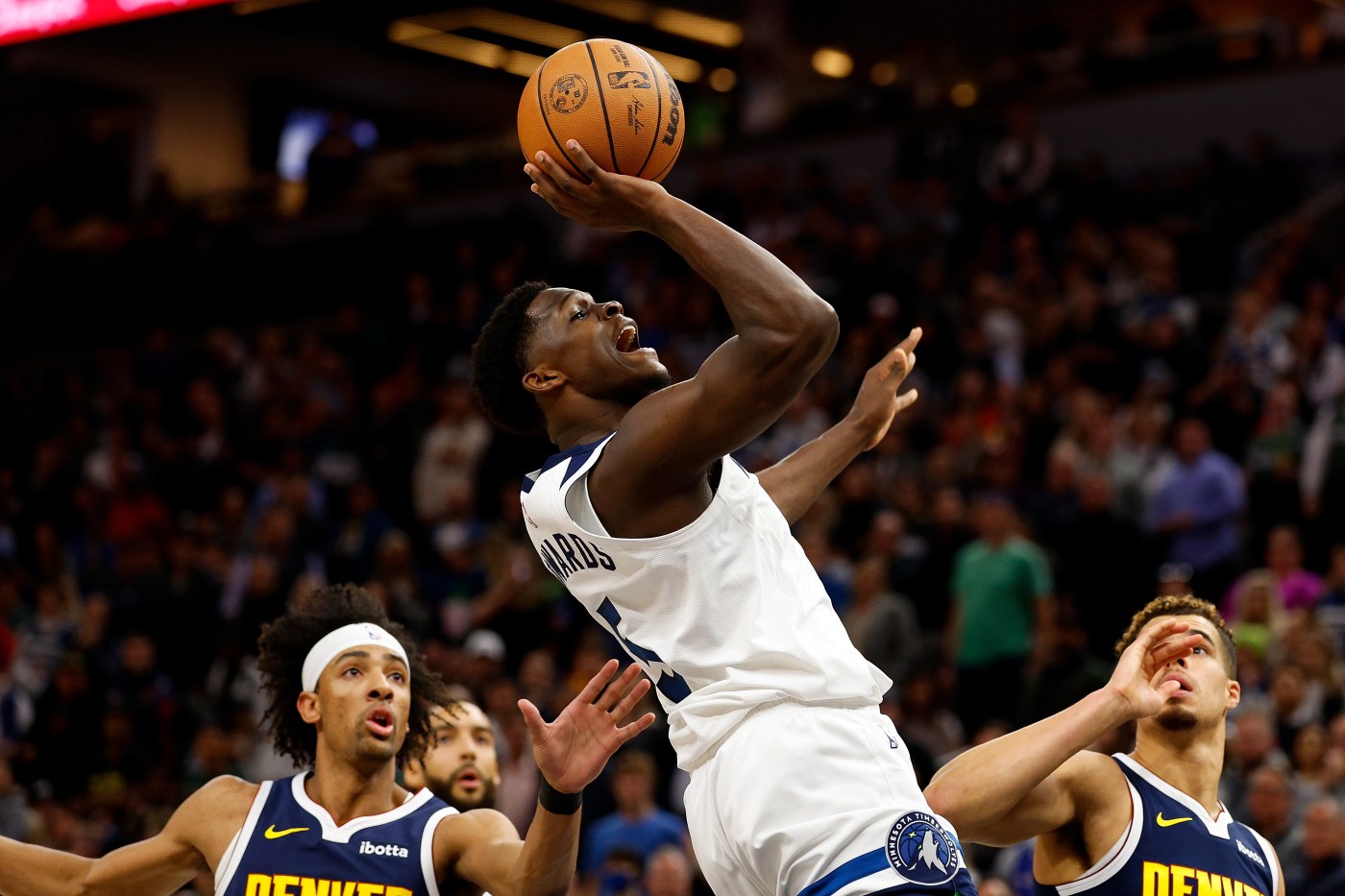
Anthony Edwards wants to think less about scoring and more about ways he can help Timberwolves win
Anthony Edwards pointed the finger directly at himself when asked how the Timberwolves can play a consistent style of basketball that mirrors what they did in Wednesday’s win over Denver.
That’s not unusual for Edwards, but his reasoning for the assertion was revealing. It wasn’t about bringing a consistent effort or focus.
“Just can’t come out being selfish, worrying about however many points I wanna score. Just playing within the game, playing within the flow, I think that’s the main thing with me,” Edwards said. “I be worried so much about scoring and how many points I got and how many points I’m trying to get instead of just worrying about the little things — rebounding, boxing out, getting back on D.”
It’s likely not an uncommon approach to the game among NBA players, particularly young ones. But to hear it publicly admitted by an All-Star was a bit shocking.
“It’s never really like a certain number,” Edwards said. “I’m just trying to score as many points as I can.”
When, of course, the object of the game is to see how many points your team can score. There will be times when Edwards putting up 40 points will serve as the best path toward the ultimate goal. And other times, it will not.
“I think the first thing is realizing when you come into the game with certain expectations, particularly ones that are driven by individual goals, you’re going to be often times disappointed,” Timberwolves coach Chris Finch said. “If the other team double-teams you every single time you touch the ball, what are you going to do? You’re going to be upset you didn’t get your 30 points.”
Frankly, Finch noted, Minnesota’s roster isn’t flush with a bunch of high-volume shooters. It’s pretty much just Edwards and Karl-Anthony Towns. Mike Conley, Rudy Gobert, Kyle Anderson and Jaden McDaniels aren’t all demanding double-digit shot attempts.
“So you’re always going to get the ball, you’re always going to have a lot of opportunities to do so,” Finch said.
But the best method of offense will always be for Edwards to draw attention — likely double teams — then get off the ball. Sometimes, the ball will come back to Edwards in a position that’s likely more advantageous for him to score. Other times, someone else will take a good shot.
“But it creates a lot of good offense for us,” Finch said.
Which is the ultimate goal. The more accepting Edwards can be of that on a play-to-play basis, the more effective he’ll be.
“He wants to take a big step forward this season,” Finch said. “But it’s not going to be just by scoring more points.”
That part is tricky. At large, when people discuss basketball players making a “leap,” it is put in the context of points per game. The people considered to be the “best” players in the NBA — outside of Nikola Jokic — are the ones who score the most points. Shai Gilgeous-Alexander was fourth in scoring last season at 31.4 points per game and was universally moved into the top 10 of the NBA’s top-100 player lists across major outlets.
Scoring is still king in the view of the public eye, even if it’s not what’s necessarily directly correlated with victories.
“I’m not sure that’s what our team even needs,” Finch said of an Edwards’ scoring bump. “We need him to score, we need Karl to score, we need everyone to score. But we’ve got to do it within the framework of what we’re trying to do.”
Does Edwards seem to be getting that message? His early-season play suggests not always.
“I would say this, if he said it to (the media), then that shows a tremendous amount of self awareness and it shows good growth and maturity and he just has to trust it,” Finch said. “When he goes through periods of the game where maybe the ball is not coming his way or he’s not getting a lot of looks or we’re taking advantage of other matchups elsewhere, stay patient and just try to stay within the flow of the game.”
That’s what Naz Reid does. Finch estimated Minnesota has run “zero” sets for the reserve big man this season, yet he’s scoring and producing at a high level by simply moving body and ball at a consistent rate.
Do that, and opportunities — easy opportunities — will find you.
“And, of course, he’s an aggressive scorer and we want him to be aggressive and we’re always going to live with sometimes guys stepping outside (the system) or going off script,” Finch said. “And we’ve all seen the runs he can get himself going on, too. Certainly not trying to take that away from him.”
But Edwards needs to be selective when employing such tactics. It helps that when he does so — as was the case against Denver, when many of Edwards’ opportunities came in transition — that Minnesota experiences high-level team success. The causation effect is clear.
“I wasn’t really worried about scoring, I was just worrying about what we can do to win the game. So I think if I come out with the mentality of not worrying about points, we’ll be alright,” Edwards said. “I don’t even really call it pressing it. I just feel like I can make every shot that I take, so I just be like, ‘I’m gonna take every shot.’ And I think when I step back and take a look, I be like, ‘Man, I gotta play a little better.’ ”
Related Articles
Timberwolves take down defending champion Nuggets to get back to .500
Timberwolves: Jaden McDaniels’ first game back from calf injury was a good one
Jace Frederick: Why Timberwolves often flip the switch from good to bad
Timberwolves melt down in second half, fall 127-113 in Atlanta
Naz Reid is loved by Timberwolves fans and players alike. Here’s why.

